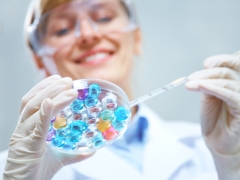On what day after IVF is the embryo usually attached and what does it depend on?
The success of the in vitro fertilization protocol depends on the correctness of the tactics chosen by the doctor, as well as on each of the stages of this assisted reproductive technique. The most exciting for a woman and her doctor is a stage that occurs after the end of the protocol. Embryos are transferred to the uterine cavity. It remains to wait until they can attach to the epithelium. Only in this case the procedure will be considered successful.
On which day implantation usually occurs after IVF and what these periods may depend on, we will tell in this article.
Implantation - process features
During natural conception, the egg fertilized on the day of ovulation or days later begins to move along the fallopian tube from the place where the spermatozoon was held in the uterine cavity, in which the baby will have to grow and develop over nine calendar months. This “journey” lasts from 7 to 10 days. On average, on the 8-9 day after ovulation, the implantation of the ovum occurs.
The whole process is regulated by hormones, which are produced in the woman's body to maintain pregnancy. In particular, progesterone prepares the endometrium for implantation, making the tissue more loose, and the vessels more permeable. When the blastocyst subsides, it must undergo two processes — first, adhesion occurs (pripaniye of the shell of the ovum to the wall of the uterus), and then invasion (implantation into the endometrium). Due to the chorion, the fetal egg begins to receive oxygen and nutrients from the maternal blood, blood vessels of the functional layer of the uterus. From now on, the pregnancy is considered valid.
During fertilization in the IVF protocol, the process of fusion of the oocyte and spermatozoon occurs outside the maternal organism, and much depends on how well the endometrium will be ready for implantation and on the exact time the doctors choose to transfer the embryos into the woman's body.
The implantation process itself after IVF is no different from the process described above, which is characteristic of natural conception. But the timing of implantation may be somewhat different.
You will learn more about choosing the day for embryo transfer by watching the following video.
Timing
To increase the effectiveness of the protocol, doctors are trying to replant during the period of the so-called implant window - the period of time when the endometrium of the uterus is as ready as possible to receive the blastocyst. Most often, this window falls on the 20-22 day of the menstrual cycle. However, depending on the type of protocol, this period may be shifted to a earlier or later time. Usually, the embryo is attached at 6-10 days after transfer, but there may be an early attachment - at 3-4 days or later attachment - at 11-12 days.
It should be noted that with natural conception the process of implantation itself lasts about 40 hours. During this time, the fertilized egg manages to pass both stages of implantation. After IVF, the process is longer - sometimes it takes up to 3 days for adhesion and invasion.
After a three-lethal embryo replant, on average, the implantation process begins in 3-4 days. Five-day embryos usually begin to implant earlier - they can begin to do this within a few hours after the transfer procedure.There may be a slightly later implantation after cryopreference.
Signs and symptoms of attachment
Implantation does not have any specific signs; in most cases, the woman does not feel anything and does not know when it was the embryos that began to implant into the uterine wall. In some women, after the natural conception, the so-called implant bleeding is observed, which is associated with a violation of the endometrium of the uterus during invasion. This is manifested by atypical brownish, pink, creamy secretions. The discharge is scanty and passes quickly.
After IVF in many women who have passed the stimulated protocol, discharge is present, but does not differ from the usual ones in the middle of the cycle, and therefore it will be almost impossible to notice the implant bleeding.
Some women note that after implantation, mood and well-being change, drowsiness appears, appetite increases, and body temperature may rise. The sensations are subjective and cannot be considered a clinical sign.
How to increase chances?
In fact, a woman cannot significantly affect the possibility of implantation after replanting. In order to maximize the hormonal background of the natural in the second phase of the cycle, she is prescribed progesterone drugs. And this is the only way to make pregnancy more likely.
In addition, a woman is recommended to follow certain rules after embryo replanting - do not take a hot bath, do not swim, do not drink any medications without a doctor’s permission, do not lift weights, limit physical activities, especially those associated with jumping and sharp torso.
A woman must abandon any diet, eat a balanced diet. In the first two days it is better to comply with bed rest or semi-bed rest.


















